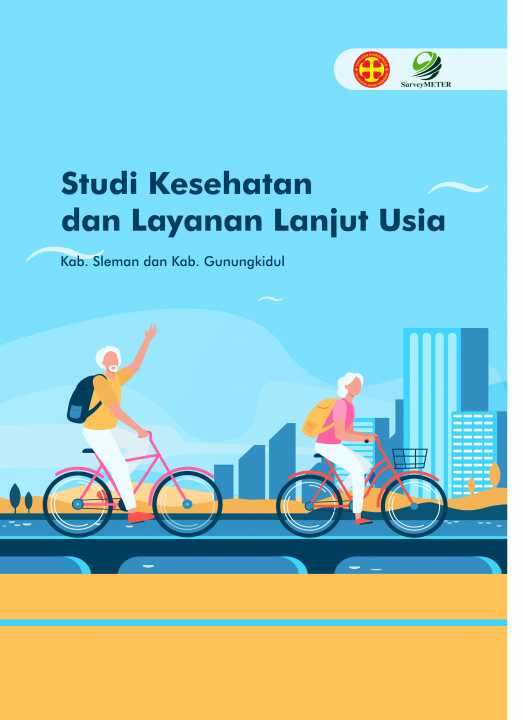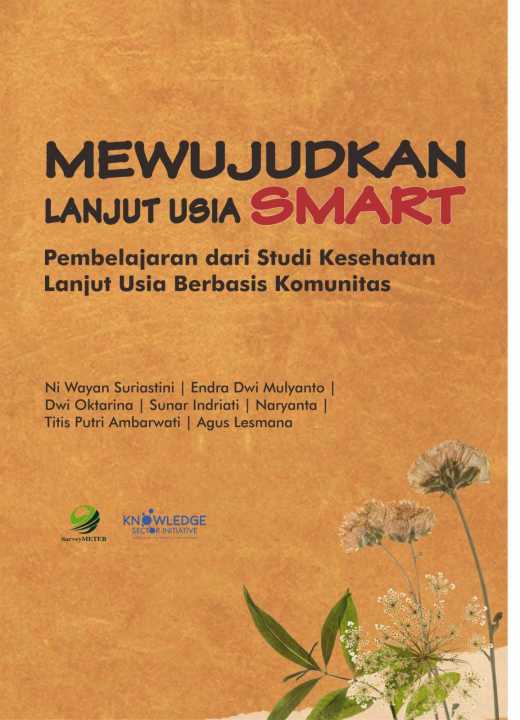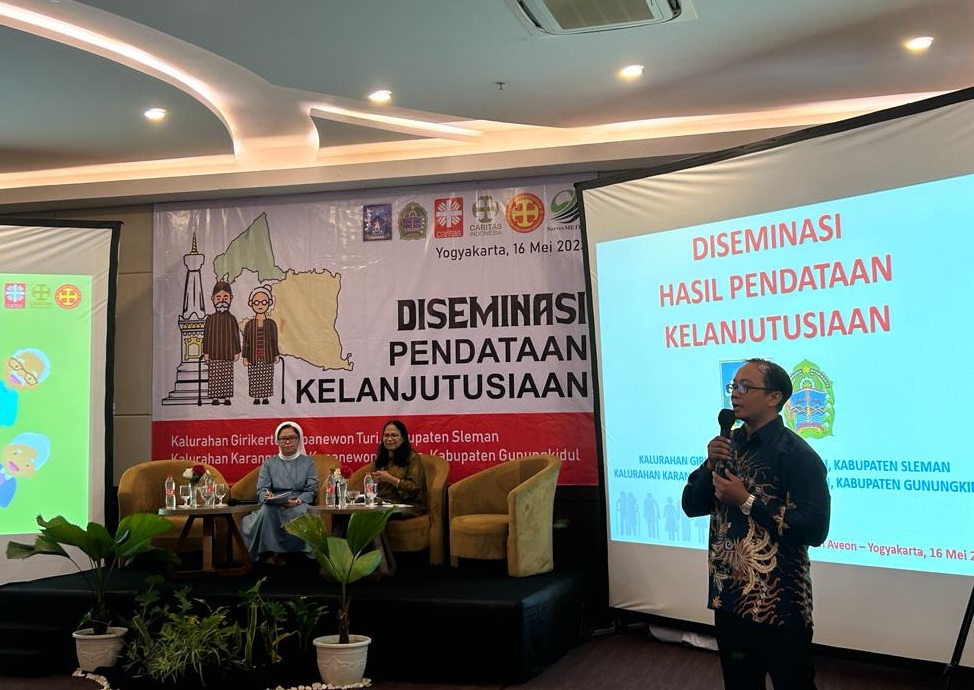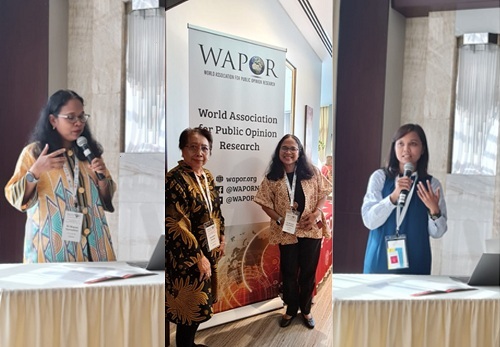Tanggal
06 September 2023
Kata Kunci
pendampingan lansia, layanan lansia di komunitas
Lokasi
Yogyakarta
Tipe
Berita
Penulis
SurveyMETER, Yayasan Karinakas
Share Artikel:
Study Report on Health and Older Adults Care Services in the Special Region of Yogyakarta (DIY)

SurveyMETER supports the Karinakas Foundation in conducting studies using quantitative-qualitative (mixed) methods involving local-domestic residents to collect data on the situation and conditions of the older citizens population. This study was conducted in two pilot villages for the Elderly Assistance Program, Karangasem Village of the District of Gunung Kidul and Girikerto Village of the District of Sleman, from August to December 2022. The older citizen population recorded consisted of 1,294 women and 1,078 men, with the dominant composition being aged 60-69 years old.
Many older adult residents live with family members, although 222 elderly residents live alone. The proportion of elderly household income is also quite worrying, of which 48.3% have an average income of less than 1 million rupiah per month. This means that 42 out of 100 elderly households admit that they need social and economic assistance programs, such as the Family Hope Program (PKH/Indonesian Conditional Cash Transfer Program), Non-Cash Food Assistance (BPNT), and others.
This household's economic condition is intertwined with a level of dependency that makes the older adults increasingly vulnerable. In both pilot villages, one in thirteen senior citizens needs long-term care (LTC), as physical decline requires assistance with mobility, therapy, social contact, and daily necessities. However, this study shows the opposite condition since almost every caregiver has not equipped themselves with skills in long-term care for older citizens. For example, most family members still encounter difficulties communicating with older adults with communication/cognitive problems. In addition, even though one in five older adults needs help with bathing, eating, dressing, and going to the toilet, caregivers do not have the skills yet to do this. In addition, the number of older citizens who receive home visit services is still very worrying. In Girikerto Village, only three out of 1,252 older adults receive home-visiting care services. Meanwhile, in Karangasem Village, out of 1,117 older adults, not even a single older adult received similar care services. Therefore, this study recommends an integrated service for long-term care for socio-economically vulnerable and dependent elderly.
SurveyMETER, akin to the technical implementer of the study, is responsible for collecting data and compiling analysis reports related to the study findings. Here is the link to download this study report.
![]() Laporan Analisis_Studi Lansia_Karinakas_final_r.pdf
Laporan Analisis_Studi Lansia_Karinakas_final_r.pdf
Tanggal
27 July 2023
Kata Kunci
PAUD,Covid-19
Lokasi
SurveyMETER
Tipe
Buku
Penulis
Ni Wayan Suriastini, Fita Herawati, Cici Permata Rusadi, Dani Alfah, Indrawan Firdauzi, Setyo Pujiastuti, Sukamtiningsih.
Share Artikel:
Adaptation of ECED During the COVID-19 Pandemic

SurveyMETER carried out the ECED Adaptation Study during the COVID-19 Pandemic in the Special Region of Yogyakarta from January to March 2021, with the support of the Knowledge Sector Initiative (KSI). This study interviewed more than 1900 respondents who were school supervisors/administrators, school principals, teachers, and parents via telephone survey. The government was equipping school principals, teachers, and parents with an ECED learning module from home by prioritizing student involvement during online learning. It investigated the extent to which the policy intervention was rigorously proper and on target.
This study portrayed the gap in access to knowledge among stakeholders in early childhood education implementation during the COVID-19 pandemic. Parents and teachers should be the key actors in the ECED learning from home. Teachers are expected to equip parents through various game-based learning methods as an adaptation during the COVID-19 pandemic, such as in the 12 PAUD Learning Modules. Unfortunately, only a few of them use or know about these learning modules since most of the module owners and module training participants were not among those who directly accompany toddlers/children learning at home.
Here is the link to download the book for free:
Full version:
 Adaptasi PAUD Pada Masa Pandemi COVID-19
Adaptasi PAUD Pada Masa Pandemi COVID-19
Isi:
Tanggal
24 July 2023
Kata Kunci
Kesehatan dan Lanjut Usia
Lokasi
SurveyMETER
Tipe
Buku
Penulis
Ni Wayan Suriastini, Endra Dwi Mulyanto, Dwi Oktarina, Sunar Indriati, Naryanta, Titis Putri Ambarwati, Agus Lesmana.
Share Artikel:
Actualizing SMART Older Adults: Lessons from the Community-Based Elderly Health Study

Indonesia is currently experiencing an aging population. More than 10% of its population is elderly, with the highest percentage of 15.7% being in the Special Region of Yogyakarta (DIY). The government encourages community-based health service providers to possess the capacity to actualize a Healthy, Independent, Active, and Productive (SMART) elderly population in the policy sphere, one of which is through health screening. SurveyMETER, under the support of the Knowledge Sector Initiative (KSI), conducted a Community-Based Health Study by interviewing all Community Health Centers, 121 Posyandu for the Elderly, and 1,010 older adults Individuals in DIY in 2021.
This study reviews the scope of elderly health screening that is yet to comply with Minister of Health Regulation Number 4 of 2019, particularly that every older adult has the right to receive screening at least once a year. Screening coverage refers to the percentage of older adults receiving health screening at health centers, most of which have not reached 50% yet. There were only two screenings with better percentages: body mass index (51%) and vital sign measurement (54%). The rest are still relatively low, such as examination of egg albumen (23%), hemoglobin (28%), blood sugar (45%), cholesterol (44%), uric acid (44%), and cognitive status as an early detection of dementia (43 %). One of the reasons is the limited human resources and budget to prioritize elderly health screening at Puskesmas. This condition is accompanied by limited knowledge of certain screenings. For example, public knowledge (Posyandu for the Elderly 6% and older adults themselves 5%) about memory disorders as a symptom of dementia tends to be low since Puskesmas is the same provider. Dementia has been normalized as an aging process that is addressed not to require screening and medical treatment. This situation emphasizes that the elderly program has not yet become essential at the Puskesmas until the service is less than optimal, and, if persisted, could prevent the realization of a SMART elderly population.
In addition to the findings above, it also examines other interesting topics such as geriatrics training and long-term care at Puskesmas, as well as the dynamics of Posyandu for the older adults and the conditions of the elderly.
Here is the link to download the book complimentary.
Full version:
Isi:
 5. Langkah yang Diperlukan Guna Mewujudkan Lanjut Usia Smart Berbasis Komunitas
5. Langkah yang Diperlukan Guna Mewujudkan Lanjut Usia Smart Berbasis Komunitas
Evaluation of health-seeking behaviour among older people during the COVID-19 pandemic in Bali and Yogyakarta, Indonesia
The COVID-19 pandemic poses the highest risk to older people with comorbidities, as the rapid spread of the virus reduces the community's access to formal healthcare facilities.
Dissemination of Data Collection Findings for Aging Study in the Districts of Sleman and Gunungkidul
Wednesday, 17/05/2023

Karinakas Foundation, in close collaboration with SurveyMETER, held a Dissemination of Data Collection Findings for Aging Study on Tuesday, May 16, 2023, at the Aveon Hotel Yogyakarta. It is one of a series of studies on Health and Healthy Aging Services in the Districts of Sleman and Gunungkidul which is also collaborating with SurveyMETER.
The dissemination was carried out in collaboration with the Governments of Sleman and Gunungkidul Districts under support from the Caritas International and Caritas Indonesia institutions.
The dissemination participants comprise representatives from the Yogyakarta Special Region (DIY) province, namely the DIY Elderly Commission and the DIY Social Service. Then representatives from related agencies from Gunungkidul and Sleman districts consisted of the Social Service, Health Office, DP3AP2KB, Agrarian Affairs & Spatial Planning, Department of Population and Civil Registration, Human Development and Cultural Affairs, BAPPEDA, Sub-district Social Welfare Worker (TKSK), and representatives of active aging cadres.
The event commenced with remarks from the Secretary of the Gunungkidul and Sleman Regency Social Services, then succeeded by a speech by the Director of Karinakas, RM Martinus Sutomo Pr. He expressed his gratitude to all parties who supported this activity, including SurveyMETER, who had fostered from initial preparation to preparing the report.
“Hopefully, the results of this activity will be advantageous for improving older adult care services in the Special Region of Yogyakarta (DIY),” disclosed RM Martinus Sutomo.

Furthermore, the presentation of the dissemination material was delivered by Sister M. Huberta FSGM from Karinakas as the activity coordinator. She conveyed the process of field activities, what had been done, and follow-up plans that would be carried out. The study was conducted in one village each in Sleman and Gunungkidul Districts.
The subsequent presentation was delivered by Dr. Ni Wayan Suriatini, M.Phil, Executive Director of SurveyMETER, who presented the results of the related study. Among the pivotal points from the study conclusions, Suriastini conveyed, referring to the findings of a data collection study which captured the condition of older adult citizens in the two study areas, including older people who need the Long-Term Care (LTC) Program and their needs, it is necessary to improve the quality of elderly care services at Community Health Centers which can be utilized as means and capital in improving older adult services at the facility.
“Therefore, an elderly integrated community-based health service system (community care hub) is also needed to improve health services for older adults,” insisted Suriastini.
Impacts of Disaster-Induced Death and Destruction on Health and Mortality Over the Longer Term
Extreme events causing death and property destruction are on the rise across the globe. We document the long-term consequences for population health of exposure to an extreme event, the 2004 Indian Ocean earthquake and tsunami, which killed an estimated quarter of a million people worldwide.
Community health centers response to the need of dementia care
Dementia prevalence among Indonesian older people is increasing. Community health centers (CHCs) as primary care providers have a responsibility to meet the need of their community.
Asian Development Bank (ADB) field visit to Five Pilot Project Areas TA 9928 REG: Developing Innovative Community-Based Long-Term Care Systems and Services
Monday, 05/12/2022Yogyakarta

Bappenas in carrying out the Pilot for Establishment of Long Term Care Services and Systems, received technical support (Technical Assistant—TA) from the Asian Development Bank (ADB). In November 2022, the Asian Development Bank conducted a series of field visits to the five pilot project areas of TA 9928 REG: Developing Innovative Community-Based Long-Term Care Systems and Services. After more than two and a half years of providing online implementation training, meetings and mentoring, the ADB team had the opportunity to meet face-to-face with all Community Care Hub (CCH) teams. In a marathon, the ADB Team met with the CCH team from Melinggih (Gianyar) and Pedungan (Denpasar City) in Bali Province as well as Banyuraden (Sleman), Guwosari (Bantul) and Wirogunan (Yogyakarta City) in D.I Yogyakarta Province. The meeting started at Melinggih on November 15 2022 and continued the next day at Pedungan. Then on 18 November ADB continued its visit to Banyuraden and Guwosari and closed the series of field visits on 21 November 2022 by visiting Wirogunan.
During this meeting, SurveyMETER, which coordinated the pilot implementation in five locations, had the opportunity to guide discussions with stakeholders from each area such as the local village/lurah, Puskesmas, PKK, elderly Posyandu and other elderly services. Topics such as the success of CCH, service delivery from CCH and hopes for 2023 are quite interesting things to discuss among them. In addition, the ADB team also held in-depth discussions with the Community Care Hub team to explore each other's understanding of care and support programs for the elderly. At each meeting, the ADB team visited a variety of active elderly activities. Starting from yoga, creative economy, brain exercises, to making traditional herbal medicine. In addition to observing the activities of active elderly people, they also had the opportunity to visit bedridden elderly or in the category of vulnerable elderly level 3. Visits to the elderly give them a better understanding of what is already going well and which areas need further support.

During the visit, the ADB team also held a one-and-a-half-day workshop with national and international consultants from the Community Care Hub. Taking place at the SurveyMETER office on 19-20 November 2022, this event became a long overdue in-depth discussion event for national/international consultants and ADB. The results concluded in the workshop are expected to facilitate and make easier for Community Care Hub services in the future.
This brief but quite profound meeting is a concrete manifestation of the seriousness of Bappenas, ADB, SurveyMETER and national/international consultants in dealing with the problems of the elderly in Indonesia. Aging is an unavoidable process. Aging in a comfortable place and safe community regardless of income level or ability is the hope of a quality life that is coveted by the elderly.
WAPOR 75th Annual Conference, Dubai, 10-13 November 2022
Wednesday, 30/11/2022

Established in 1947, the World Association for Public Opinion Research (WAPOR) is an international professional association of researchers in surveys and public opinion research. This year, the conference took “75 Years of Worldwide Public Opinion Research” as its theme, and presented the event with prominent speakers in public opinion research. Over 250 researchers from 57 countries attended the conference.
SurveyMETER – the only representative from Indonesia and first to attend the prestigious event – presented two papers in this forum using data from the 2018 World Values Survey (WVS). First paper “Parents’ perceptions on teaching social values and character to their children at home in Indonesia” was presented by Ni Wayan Suriastini, the Executive Director of SurveyMETER. It highlighted values of Indonesian parents’ inclined to be passed down to their children and also looking at parental background affecting this particular issue. Second paper “Internet access and perception on science and technology in Indonesia”, discussed by Dwi Oktarina, researcher from SurveyMETER, argued that people who accessed the internet daily were less likely to have stronger opinion on science and technology than their counterparts. Bondan Sikoki, the founder of SurveyMETER and co-author of the first paper, also present and participated in this event.
On-going conversation and publications with respect to public opinion from various countries around the world broaden knowledge and insight of the participants. Research focusing on public opinion is critical to ensure people’s voices are heard and democracy is being carried out properly.
Longitudinal outcomes of post-traumatic stress disorder among the Indian Ocean tsunami survivors in Indonesia
Post-traumatic stress disorder (PTSD) following a disaster could change over time. This study aimed to analyze the risk factors of PTSD among the 2004 Indian tsunami survivors in Aceh and North Sumatra province, Indonesia.